
The Business that empowers Aspirations
Shapoorji Pallonji
At Shapoorji Pallonji, every initiative is undertaken with the aim to be a good
corporate citizen, enabling the growth of all communities while engineering
progress. Since inception in 1865, Shapoorji Pallonji is committed to providing
solutions that have a lasting impact on society. The Group firmly believes that
smart
engineering can bring the world closer and make our planet a better place to
live in.
The Group, which has spread its business wings across engineering
and construction,
infrastructure, energy, real estate, water and financial services, at its core,
strongly
believes that business should be done responsibly and sustainably. Matching with
such
high standards of responsibility, Mr Shapoor Mistry, Chairman, Shapoorji
Pallonji
Group (SP Group), coined the term ‘Stronger Together’ as a message to the
employees,
aptly reflecting the company’s motto and ethos all at once.
Even before
Corporate Social Responsibility (CSR) got mandated, the Group was
involved in supporting work on improving education access, providing safe
shelter to
orphans and medical aid to the most needy. With the formalising of CSR, the
Group
has a well-defined CSR Vision and Strategy. A bottom-up, design thinking
approach
to develop solutions in partnership with the local community is the essence of
the
CSR philosophy. The beneficiaries are placed at the center of all decision
making and
programme development. Ms Zarine Commissariat, Head CSR, Shapoorji Pallonji,
shares that “on-ground implementation is done in partnership with
non-governmental
organisations (NGOs) and local community members with clear deliverables and
stringent monitoring. Impact measurement is integral to the work we do”.
The
Group views CSR as independent of its business, the CSR projects are undertaken
where the need is the most and not necessarily where business interests are.
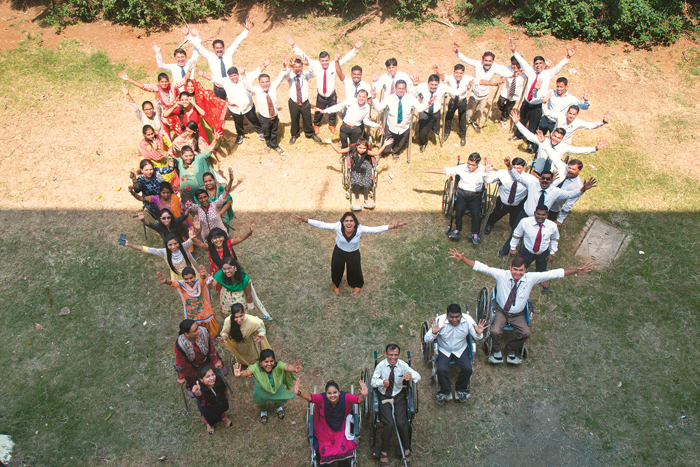
"Employee engagement is at the heart of SP's CSR philosophy"
A strong nation and a stronger society can only be built by educating its children. SP Group has over the years invested in strengthening the quality of education in government and tribal schools specifically catering to the most marginalised communities in tribal and rural districts.
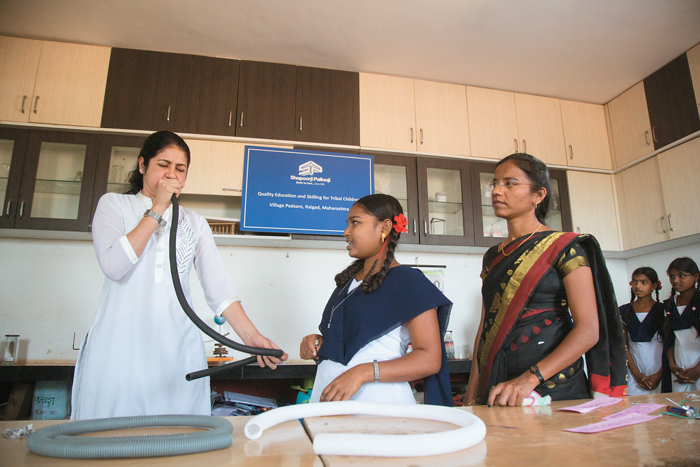
"Chotta Scientist programme helps hone the students science skills."
In 2012, Mrs Rohiqa Mistry, wife of
promoter Mr Cyrus Mistry,
visited a small tribal school in the remote hamlet of Padsare,
Raighad, Maharashtra. Passionate about education, she was
impressed with the commitment and dedication of the team
managing the school, despite meagre conditions.
With the combined
resources of the SP Group companies, an
ongoing school transformation commenced, led by Mrs Mistry.
Road access was improved, classrooms and toilets built, safe
drinking water and solar energy provided. In partnership with a
renowned education NGO partner, children’s learning levels were
improved and spoken English introduced. The children were also
provided with nutritious supplementary diet.
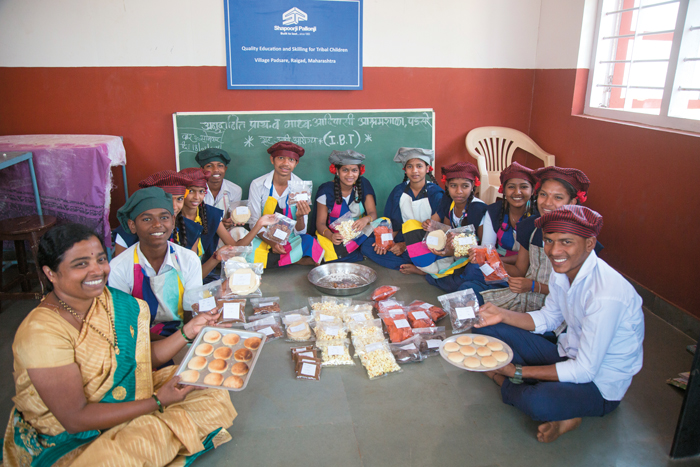
"Vocational skills help students gain confidence and equip them for future work opportunities."
- 90% children retention and less than 10% dropout rate as compared to the previous 20-25%
- 75% increase in enrolment with total student count touching 550 and the school imparting composite education from class 1 till class 10
- The first batch of class 10th SSC boar d exam breezed through with 91.4 passing percent and the second with 97 %
- It is the first tribal school in the district to receive ISO 9000 Certification
- Students excelled in block and divisional le vel sports competitions
- The school is often quoted as ‘Model Tribal School’ by education and district officials
By 2018, the children excelled in both
academics and sports with
exposure to digital learning, personality development, sport
coaching and vocational skills
Using the Padsare school as a template for a
model school, Mrs
Mistry’s vision was to extend the education improvement work to
local government schools in the vicinity of the tribal school so that
more children could benefit from the impact.
The Education Improvement
Project began in 2015 across 50
Zilla Parishad schools and later scaled up to cover 98 schools
impacting over 5000 children. Through the programme, 250
government school teachers were trained and learning levels
witnessed an upward trend.
Poor nutrition in the first 1000 days of a
child’s life can lead to
stunted growth, cognitive impairment and alter metabolism.
Various studies reflect that over 40% of infants below 3 years of
age are malnourished. Due to low socio-economic status their diet
often lacks necessary nutrients.
With the aim to combat malnutrition, SP
Group piloted the
Nutrition Positive programme in 2017 at Palghar, Maharashtra
and the urban slums of Mumbai. The programme was
undertaken in partnership with the government ICDS scheme
at the government managed anganwadis (child care center).
“The initial need assessment reflected the main obstacles
faced by the anganwadi centers in terms of low attendance
by children, erratic food distribution and poor hygiene. Lack
of awareness among the mothers on the importance of good
nutrition for children and for themselves was another factor”
says Zarine Commissariat.
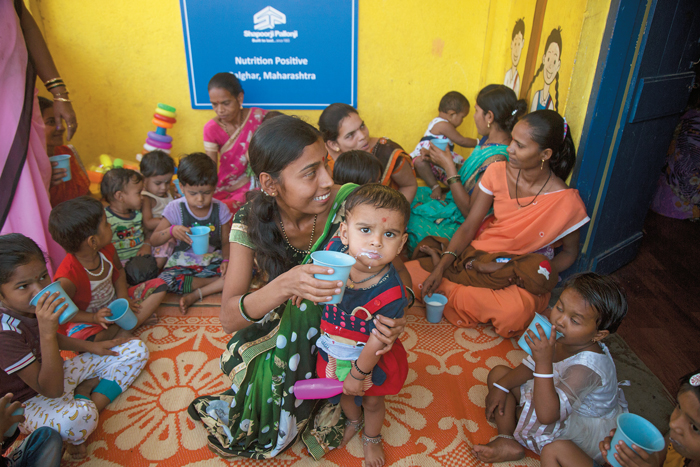
"Mothers and children relish the daily glass of milk served in anganwadis."
- Aiding anganwadi workers in managing h ygienic food distribution, health monitoring of children, providing nutritious supplementary foods.
- Training young mothers on importance of nutritious diet for their children and for themselves
- Working with women in the communities to use locally available nutritious food in their diet
- Creating awareness within the community to frequent anganwadi both for nutrition and for health check-up
- Covered 4700 children and 570 pregnant and lactating mothers
- More than 1.2 million nutritious feeds served
- Attendance at Anganwadis rose from 50 to 80 per cent
- 79% of the malnourished children are now at age appropriate height and weight
- Create a team of Mother Champions who would spread the importance of good nutrition to others in the community
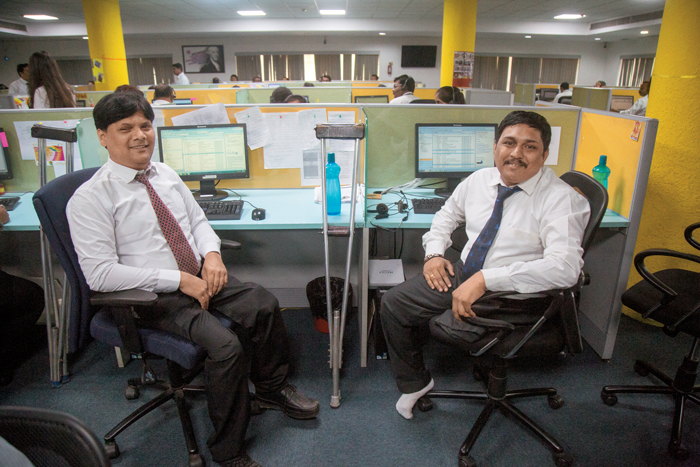
"EuroAble gives them not just a job, but respect and a sense of self-worth"
- 159 Orthopaedic and visually impaired persons trained and employed full time earning a respectable income
- Over 6000 inbound and outbound calls managed per day
- One of Asia’s largest call centers managed by differently abled
- EuroAble has won multiple state and international accolades. It includes Helen Keller award, Nipman Foundation award and a Presidential Recognition.
Large parts of rural India are facing severe
water stress.
With increasing dependency on groundwater, our water
tables are fast depleting, thus affecting agriculture and basic
sustenance in villages. With the aim of providing access to
water in some of the most water scarce districts in India,
SP Group launched a pilot project in 2018-19 to build check
dams in Alwar district, Rajasthan.
Working in a sustainable partnership model
with the
local community, this project is designed to empower
the villagers by educating the community about water
harvesting and entering into a partnership only if the
entire village agrees to stop traditional practices like
child marriage, dowry system, alcohol and tobacco. The villagers also contribute
towards the construction of the dam
in terms of physical labour and procurement of materials.
This ensures that there is ownership of the dam among the
villagers and they will maintain it in the future, thus creating
a sustainable model.
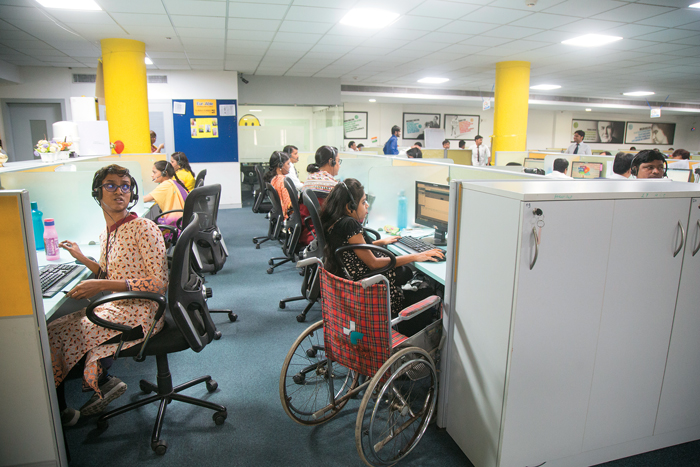
"EuroAble gives them not just a job, but respect and a sense of self-worth"
- In one monsoon alone, the dams stored 320 million litres of water benefitting over 20,000 villagers.
- Wells in proximity of the dams got recharged, benefitting the entire village, especially women, who previously had to trudge for numerous hours with pitchers full of water for household use, taking a tremendous toll of their health and physical wellbeing.
- Farmers had better crop yields, witnessing a 37% increase in income
- 100% of the land came under irrigated cultivation, allowing farmers to grow two or three different crops.
- The female child can now attend school as the mother has the time to take care of household chores.
- Before a villager could not afford one bullock to plough his fields, he now has eight to nine buffaloes and cows tied to his doorstep.
- Health, hygiene and quality of life improved tremendously.The children no longer are malnourished.
- Check dams have all the advantages of large dams with none of the disadvantages -- like water logging or displacement of the populace.
SP Group plans to expand its work in the water sector and is on track to build a total of 50 dams in this year.
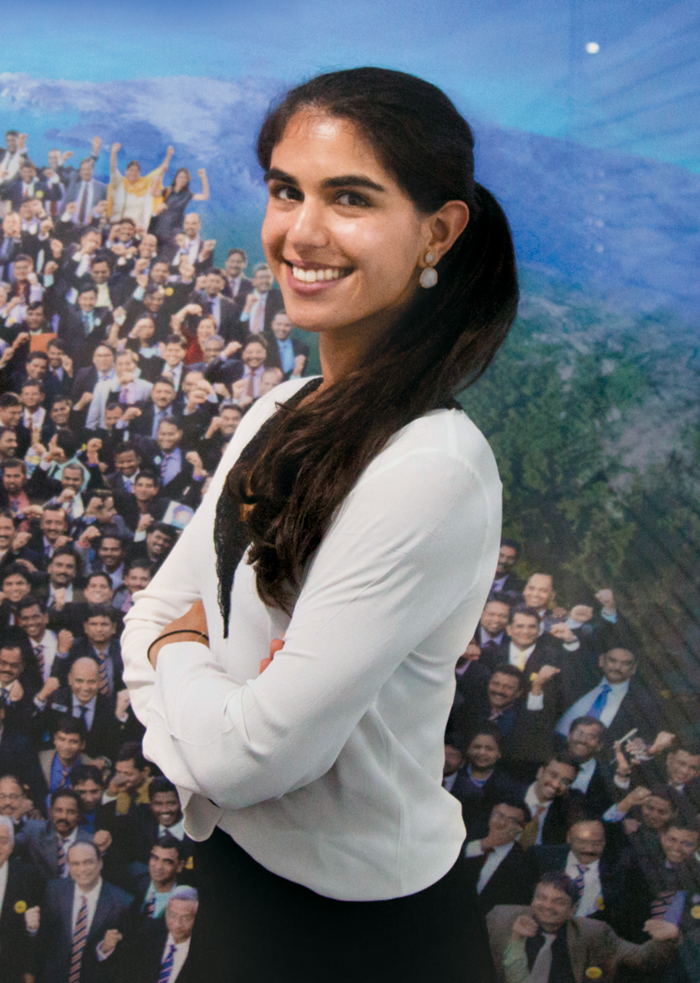
Tanya Mistry
Director CSR, Shapoorji Pallonji
How do you view CSR as an activity?
I view CSR as an innate responsibility. The past decade has been marked with several disruptive shifts in our economic and social order, accompanied by a gradual deterioration in our planet’s ecological stability. It is clear that businesses have a social responsibility to our nation and to the world at large. We need to be more proactive and resilient in shaping a better future and a healthier planet.
What prompted you to develop a more sustainable model for CSR?
I realised that every project we do has to be sustainable. And to ensure the same, we begin our work by closely working with the beneficiary and the community members. We adopt a consultative approach where the expertise of our on-ground partners, the community and the CSR team is pooled in to create solutions that bring about a lasting impact.
CSR is not charity, rather it is strategic development in which sustainability of the intervention is key. Without sustainability, a project will remain philanthropy instead of enabling and empowering beneficiaries. I also am working on making sustainable changes at the work place. I would like to instil a bottom up culture within SP to ensure that everyone has a say, giving them the ability to contribute on an individual level with the goal of building a culture within the organisation to assist the broader CSR goals organically.
What has been your learning about CSR from people other than family?
Having majored in Psychology and not Sustainability or Social Work I try to learn from people every chance I get. My CSR team is instrumental in guiding me and showing me the ropes. I have been working on projects with our CSR Head, Zarine, since I was in high school. Having ample knowledge in this field, she is a great teacher. One of my professors from college, Ric Grefe, taught me a lot about empathetic problem solving and the power of design thinking. With his help I refined our project designs, strategy and long-term goals. I learnt a great deal from a week-long Sustainability and Leadership conference I attended at the University of Cambridge. I also attend talks and chat rooms whenever possible.
How is iCare program and CSR associated?
iCare is an employee
engagement initiative that I
launched one year ago in the
SP Group. It now has 3,000
members across all our regional
offices. iCare is a common group
platform for our workforce to
start engaging with social and
environmental issues. It was
my vision to create a bottom
up culture within SP to ensure everyone has a say, giving them
the ability to contribute on an
individual level with the goal of
building a culture of compassion
within the organisation. iCare
runs quarterly programs in
different social themes from tree
plantations to blood donations to
mentoring underprivileged kids.
The chosen programs reflect the
CSR work of our company in
hopes that our workforce would
start getting more involved and
engaged in what we do.
For example, we held science
mentoring workshop at the tribal
ahramshala in which we work.
Employees from 4 different
group companies spent 3 of their
Saturday’s with the kids at the
school playing, coaching and
interacting with them. I recall one
employee telling me she had been
waiting for a program like this for
a long time and she is so thrilled
that her company is giving her
this opportunity. Its feedback
like that which makes my job
worthwhile. Overtime I hope
iCare will foster a stronger more
meaningful bond between our
workforce and our organisation.
It is about doing business with
a heart.
Stories of love: Ramkay Gupta and Naina Waghela found each other right here at EuroAble. He was a team leader and she was the best listener and performer. Both feel the family-like atmosphere at EuroAble helps people to form a strong bond. Overtime their love blossomed and they are planning to get married soon. The two employees, like the many others, feel that job at EuroAble has given them respect in society.
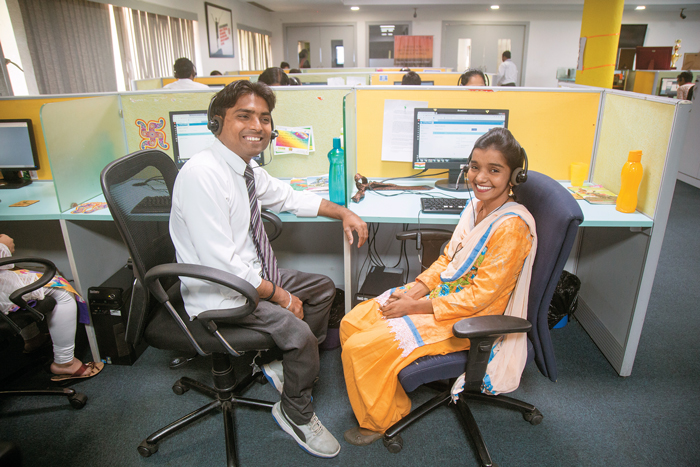
Anish is a class 8 student and wants to become a Police officer. An expert in drawing, he is thankful that the lighting facilities with the help of solar panel installed by SP have made the place safe. It is an electricity deficit area but with solar panels, the dormitory and central area are lit up in case of power cuts.
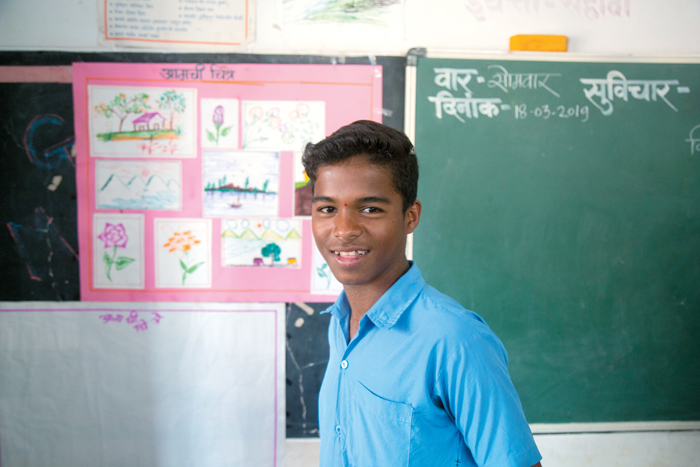





"Mothers are made aware on using locally available grains and food items that are high in nutrition."
“Humanitarianism is an ethic of compassion founded on an idea of equality. Equality is the acceptance that all living creatures are born with dignity and are owed respect and equal rights and opportunities. Nearly 30 million Indians have special needs. These individuals are less likely to get an education, secure an income and live a dignified life” says Ms Tanya Mistry, Director CSR, Shapoorji Pallonji Group.
The Group’s CSR intervention under the theme of Social Inclusion focuses on providing employable market related skills and opportunities to the differently abled.
Since 2011, the SP Group company, Eureka Forbes Ltd, has built an effective model for employability for the differently abled. The result of this initiative is setting up of ‘EuroAble’—the only call center in India fully manned and operated by differently abled youth.
The programme is organised in association with the National Society for Equal Opportunity for the Handicapped (NASEOH) in Mumbai. It aims to develop skills, employ and empower differently abled youth. The 5,000 sq/m call centre oozes not only self-confidence and a sense of achievement but also a lot of positive energy. Done up in bright yellows, greens and blues, the workstations and aisles are bigger than they are in other offices, and the floor is carpeted, so that the crutches and wheelchairs won't slip. Here, youth go through one month of intense training, including in soft skills, English training, product knowledge and SAP training before being placed at the centre.
Six couples have found love at work, some starting their own families and there are more lovebirds waiting in the wings!
The initiative gives the differently abled a platform to demonstrate their potential, to live with dignity and be financially independent.
By treating them equal and giving them equal opportunities, EuroAble has managed to blur the lines of discrimination.